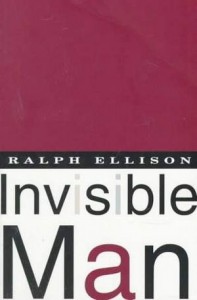 Ellison’s Invisible Man
Ellison’s Invisible Man, not H.G. Wells’ more enjoyable The Invisible Man
, deals with race relations both in the south and north of 1940’s America. The treatment is abstract, though, as everything is filtered through the nameless protagonist’s first person perspective. The story follows him through a series of unfortunate circumstances, starting at college, to his transplantation to (where else?) New York City, through a few jobs, a lobotomy, and finally ending up with a political activist group with a generalized purpose to agitate the public.
The story itself wasn’t a turn off, but as I read I discovered what was so distasteful about it. It was the idea that the protagonist inhabits a universe in which every person and circumstance turns against him, coupled with the fact that the protagonist himself maintains his paranoia-free optimism through each soul-rending episode. I can’t conceive of a universe in which this is even existable (my word) hypothetically, where the physics of interpersonal relationships consistently follow certain patterns while the protagonist is exempt from those patterns (though, it could be argued he falls in line with those “laws” at the end of the book).
I realize that stories have to be unusual in order to be stories in the first place, but there are limits to that. There’s a problem when I’m consciously substituting “Candide” every time the protagonist references himself. Granted, the situation isn’t as bad as Collie’s from Apologize, Apologize!
*, where he purposefully places himself (rather, remains) in negative, dysfunctional circumstances because he too stupid to engage his instinct of self-preservation. Invisible-Candide has that crucial instinct but the relentless dehumanization of his circumstances makes it irrelevant.
* From this incisive reader review of A, A! on amazon:
The phenomenon of reviewers who examine wildly dysfunctional, ghastly people in novels/movies/TV shows, and declare the miserable circumstances in which the miserable characters wallow in circumstances utterly without redeeming social value and then declare them to be funny, rollicking, humorous, or any other positive permutation of humorous strike me as being themselves deeply disturbed.